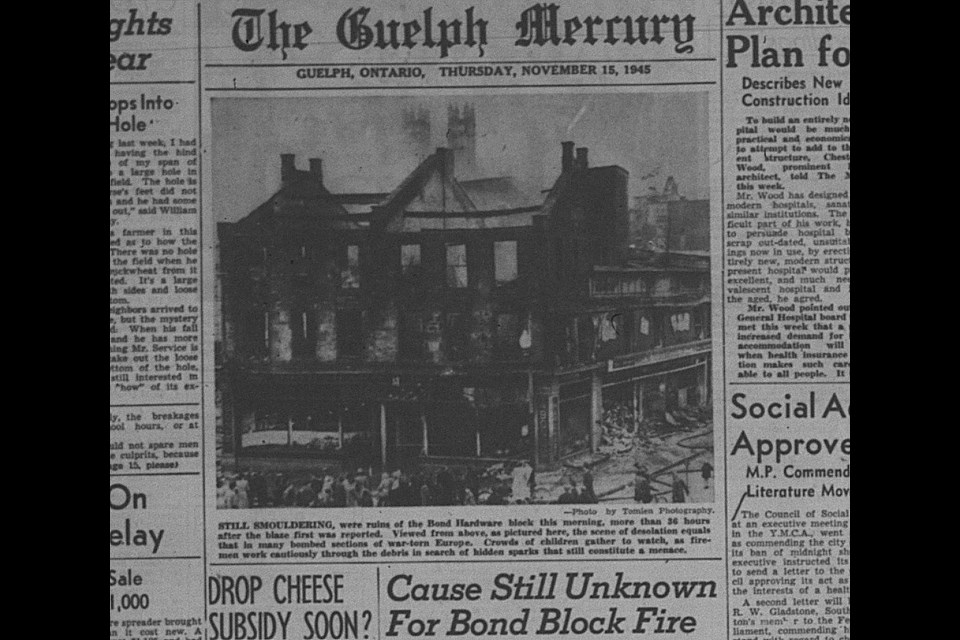The Bond Hardware Store, a long-time landmark in Downtown Guelph, dominated the business block on Wyndham Street between Cork and Macdonell. It served the needs of the residents of Guelph and the surrounding area for generations. Then one night in November of 1945, disaster struck.
On the evening of Tuesday the 13th, a fire started in an aisle of the hardware store. It might have been caused by combustion in some oily rags or by a carelessly tossed cigarette butt. It was probably the worst place in the building for a flame to ignite, because it spread quickly to shelves where cans of paint were stored. The Guelph Mercury described what happened next,
“From the paint, flames climbed the short stairway to a landing where pumps for dispensing oils and paint dryers were located. Gaining volume and momentum as its increased heat dried approached areas, the river of fire poured up and down nearby staircases, then spread from building to building until stopped by valiant fire-fighters and stout firewalls.”
The blaze was first reported at 9:28 p.m. and firemen arrived within minutes. But by that time the wooden interior of the building was an inferno that was almost impossible to contain. Guelph’s water system proved to be less than adequate. Fire chief Charles Vince explained that while a 12-inch watermain served the hydrants on Wyndham Street, the watermain that supplied the hydrants on Macdonell was only four inches.
The most spectacular part of the conflagration was on the Cork Street side: “White-hot flame roared madly from every window opening,” said the Mercury. “Heat was so intense at this point that paint was blistered on buildings 50 feet away. Water, even on the sidewalk farthest from the blazing building, evaporated into steam as heat blazed downward … At the same time, from the top back windows of the hardware store on the Cork St. Side, the flames, soaked in oil, belched out in a terrific blast of fire and black smoke. They continued to shoot out half way across the street until they finally played themselves out.”
The situation became even more dangerous when the flames reached the store’s stock of ammunition at about 10:45. For over three minutes the roar of the fire was accompanied by the racket of exploding rifle bullets and shotgun shells. It sounded like a World War II battle had flared up in Guelph. Fortunately, no firemen were hit by the volleys of bullets and shot. The only injuries were cuts caused by broken glass that became embedded in the fire hoses.
Firemen with small hoses climbed to the roofs of nearby buildings to put out fires caused by windblown sparks and flaming debris. Telephone linesmen cut down wires that were sagging from the heat and posed a hazard if they connected with the streams of water flowing down the streets. Off-duty Bell telephone operators were called into work to help with the flood of calls that were overwhelming the women on the switchboards.
Men from the Guelph Carpet and Worsted Spinning Mills volunteer fire brigade pulled on their rubber boots and coats and joined the city fire department in battling the blaze. The spectacle of the huge fire attracted a large crowd. Many parked their cars on Wyndham St. and sat in them to watch the show. Police constables tried to keep the spectators back by roping off the area, and even had to break up a fight.
Under the supervision of two city scoutmasters, Boy Scouts helped rescue goods from shops and apartments threatened by the fire. They were assisted by servicemen still in uniform. Soon furniture, appliances, rugs, books, clothing and other merchandise was piled on the sidewalk, as well as printing presses and other equipment from the Leaman Printing Company. Police officers who already had their hands full with crowd control had to deal with teenage boys who tried to pilfer from boxes of cigarettes and stacks of magazines that had been rescued from Mowatt’s Tobacco Store. Volunteers managed to save a quantity of nuts and popcorn from a shop called The Nuttery, but made the mistake of placing the boxes too close to a crowd of kids.
While everyone’s attention was focused on the big fire, in another part of town thieves took advantage of the situation by breaking into the students’ co-operative store at the Ontario Agricultural College. They got away with money and over $1,500 worth of merchandise.
It took firefighters more than three hours to get the blaze under control. At noon the following day the exhausted firemen were still putting out hot spots. Bond Hardware, which was gutted, had an estimated $200,000 in damage – over $3 million in today’s funds. Nine other businesses suffered fire, smoke and water damage. One barbershop was destroyed when its ceiling caved in.
Less than two months earlier, fire had badly damaged Jack Stewart’s dry cleaning and wool processing plant which was housed in a historic frame and stucco building on Quebec Street that dated back to Guelph’s early days. One woman suffered burns to her face and hands. That fire might have been much worse, but two young men had risked their lives to roll three barrels of highly inflammable alcohol away from the burning building.
No doubt, the storage of hazardous materials and the danger of further deadly fires were matters of priority that fall for city hall and the Guelph Fire Department.



